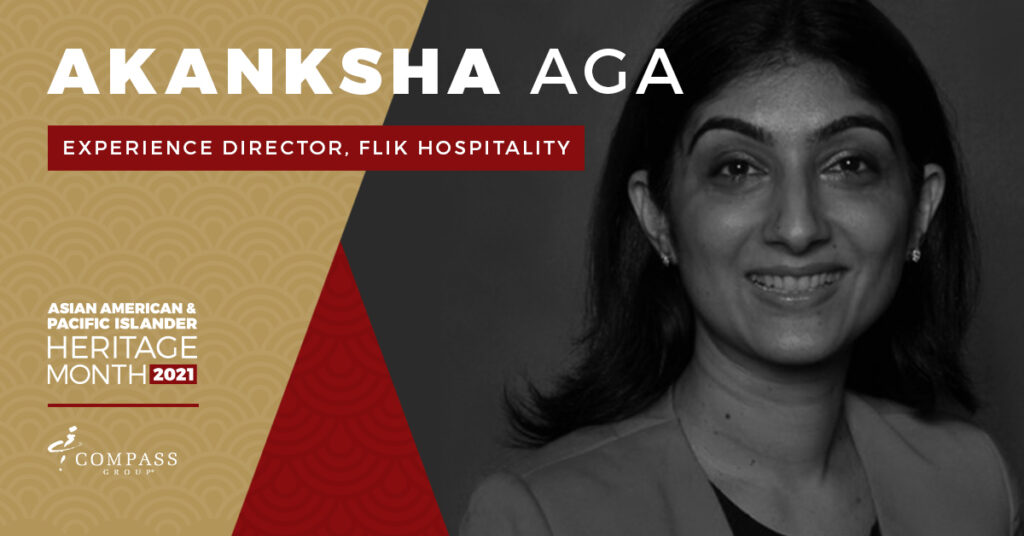Celebrating Asian American and Pacific Islander Heritage Month: Akanksha Aga
Akanksha Aga is celebrating 20 years in the U.S this year. Born and raised in India, she came to the U.S as a student and has been with Compass Group since 2016. Read her story to learn how Akanksha is embracing her past to empower others to embrace their authentic self.
Why is it important that we celebrate Asian American Pacific Islander Heritage Month?
It’s really important that we celebrate our differences. Differences are not meant to just be tolerated; they aren’t like spinach or a food you don’t like but have to eat. They should be celebrated and respected.
I think heritage month celebrations can really make people think about how they relate to others. Recognizing other cultures goes a long way in bringing awareness, dispelling myths, and maybe changing the conversation around racial stereotypes. Having those conversations is how we create meaningful change.
What was it like growing up in India, then moving to the U.S.?
In India, I didn’t grow up as a minority. For the first half of my life, I didn’t even know I was brown. My family traveled because my dad was in the military and when I was around six years old, I traveled to 10 countries in three months with my parents. The first time I really remember recognizing differences was when I was standing in line in Europe and I saw someone with blonde hair. I was six and had never seen blonde braids before, and it was a moment I’ll never forget.
Questions about my identity weren’t entirely new. For one, my first name sounds predominantly Hindu and my last name sounds predominantly Muslim, so that was an interesting conversation starter when you’re 10 years old and the new kid in school.
When I moved to the U.S., I found myself in the minority. There weren’t as many people who looked like me and it was a bit of a transition, but I found ways to connect to people. In class, I would sit with students from different countries. My roommates were from Indonesia and Morocco; it was great!
The theme for this year’s AAPI Heritage Month is Advancing Leaders Through Purpose-Driven Service. How do you encourage others to be leaders?
I love that leadership is part of the theme because it is part of my purpose. I try to help individuals find their authentic leadership style. There is a difference between authenticity and authentic leadership. There are certain traits people may need to develop in order to be a leader. That is just basic leadership development. But in order to be an authentic leader, you have to be comfortable in your own skin and that part requires some heavy lifting.
As an industry, I believe we have a greater responsibility because it’s not just connecting over food or connecting over experiences, it’s connecting over differences and individuality.
How do you encourage people to bring their authentic selves to work?
I have started sharing more of my own story as a way to spark such conversation. I used to downplay my story because I had parents who supported me emotionally, worked hard to support my education, and I recognize not everyone has that. But I want to inspire others to be more open and vulnerable in their own experiences.
We need to make space for differences – sharing experiences is one of the ways we can create that space and build understanding. The leadership in our company are engaged in this. I am excited to be a part of doing that work.
How does your heritage influence your daily life and work?
I think I truly grew to love my culture more after I moved to the U.S. When I was growing up in India, I used to watch the TV show “Friends” and wanted all the American things. As I grew older, I became more comfortable in all parts of my identity. Now, I want my daughter who was born here to have the best of both worlds. My husband and I speak Hindi at home, and we are trying to teach her as well. When my daughter was around five, she asked us if she was Indian or American and I said, “What do you think?” We talked about it, and she decided she would like to be both! Being Asian American doesn’t mean any one thing. I think it can mean a lot of different things. I think we should not define an identity for anybody. I have seen so many people who, even as adults, struggle with their identity and where they fit in. But there can be a balance that embraces all cultures.





